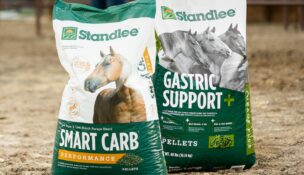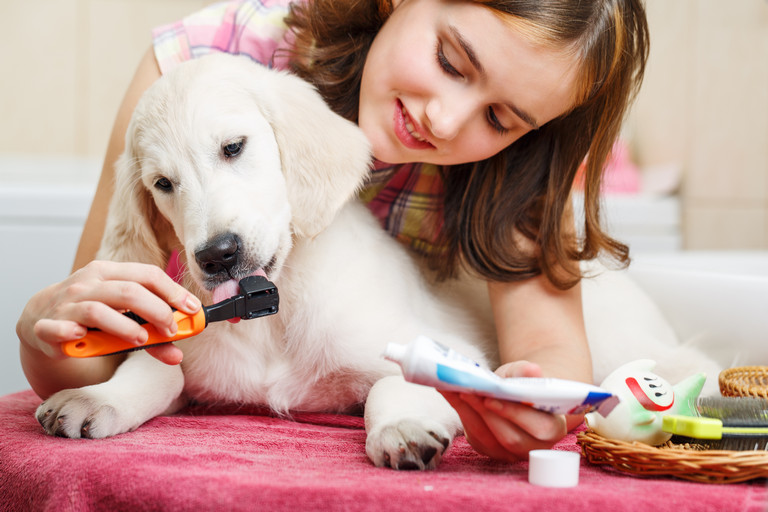Investing In Their Health
Pet Age Staff //May 24, 2013//
If you’ve got a shelf full of multi-vitamins and dietary supplements that sits in a dark corner of your store and collects dust, it’s time to bring those products up to the forefront.
While supplements might still be a relatively small segment of your total sales, this is a growing category, and one that’s important for the health of all pets. 
According to Greg Tilford, president and CEO of Animal Essentials, the category had sales of about $2 million in 1995, has grown to $1.4 billion now, and shows room for even greater growth.
The last survey by the American Pet Products Association reports that the percentage of dogs and cats given vitamins or supplements grew 2 percent each, to 14 percent of the total supplement category, from 2008 to 2010.
Even though that might seem like a relatively small percentage of sales, what’s even more promising for future sales is the survey’s findings that the increased use of vitamins and supplements may account for what appears to be improved general well-being of several species of pets.
“Your customers might be paying a little more initially, but when you take into the fact that you’re not going into the vet for an issue every three months or so, you save money in the long run,” Janice Coles, owner of Pet Store Universe, Lehighton, Pa., said.
Vitamins and supplements not only aid in a pet’s digestion, they will also help reduce gas and bad breath and help pets have more vitality.
“Vitamins are kind of like insurance;, they are essential to the body’s functioning and keep the muscle tissue in better shape,” Phil Brown, DVM and consultant for Nutri-Vet, said.
Customers who are already paying a premium for pet food might be reluctant to spend extra money on a supplement when they feel the food they’re feeding is a higher quality. The best answer to that is that the supplements will help the dog utilize the food to its full potential, making sure they process all of those great nutrients in the food.
The following are some of the most popular types of vitamins and supplements and how they work.
Superfoods
Pets are exposed to the same pollution, smoke and even radiation that people live in each day. Antioxidants can help break down the free radicals produced by these environmental stresses, which means the superfoods that are good for us are also good for our pets.
“Supplements are one way to help add antioxidants to the diet of dogs and cats to help their bodies detoxify and replenish on a daily basis,” Patricia Jordan, DVM, chief veterinarian for Rocky & Bella, said.
park, the new supplement from Rocky & Bella which came out on the market last year, is a combination of whole-food ingredients, including liver, blueberries and algae, available as a powder that can be sprinkled on dog or cat food.
Another choice is the Superfood Daily Supplement from Nutri-Vet.
Made with broccoli, carrots and spinach, it also includes some beef and pork liver to enhance palatability. Both of these products enhance the pet’s diet and help improve their quality of life.
Multivitamins and Herbal Supplements
“The role of a multivitamin is to compensate for any micronutrient that’s in a low amount in the pet,” Brown said.
The Multivite Soft Chews from Nutri-Vet are a similar make up to the multivitamins for people, with which pet owners are already familiar with. They have potassium, iron, zinc and vitamins A, D, E and C.
“It’s based on added B vitamins for energy as well,” Brown added.
Animal Essentials also has a vitamin, the Herbal Multi-Vitamin and Minerals, which has the familiar mix of A, B, D and E vitamins, zinc and folic acid, as well as herbal ingredients, including flaxseed, chia seed and barley grass.
Probiotics
One of the newest trends for people has also come to the pet world — probiotics.
“Our product, Plant Enzymes and Probiotics, is our best-selling supplement,” Tilford said. “Whether your animal is sick or not, they have a limited ability to process their food, and these enzymes help break down the vegetable matter and get the most out of their food.”
Annamaet Petfoods also has a supplement with probiotics and enzymes to help with the breakdown of amino acids. For Coles, the Annamaet supplements are what she recommends to customers.
People come to her looking to improve the health of their pet, and her first priority is to get them on a better food, and along with that a supplement to make sure the animal gets the most out of their food.
For the supplement category, educating a store’s staff is key to increasing sales. Make sure the whole staff knows what supplements the store stocks and the benefits of each item. Many times a manufacturer’s sales team can help to provide that education.
Another tip, experts say, is not to stock too many of one type of supplement.
“If there are 16 different supplements that do the same thing, the customer won’t be able to make a decision and will just walk away,” Brown said.
Finally, cross merchandising is a great way to get supplements out in front of the customer’s eyes.
Set up a display near the food to help remind customers that they can be feeding a supplement each time they feed their pet.
Put some supplements near the toys with signage explaining the increased energy and vitality supplements bring, and set up a display near the shampoos and grooming items touting the benefits to skin and coat.
“The more people see something is available the more likely they are to pick it up,” Brown said.


















